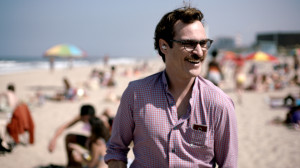
By: Greg Perciavalle | The Duquesne Duke
After seeing Spike Jonze’s Her, I tried to pick apart the film and it became apparent to me why the movie was generating such a buzz.
The poster says it is a love story, and in this respect, it does not disappoint, but to simply pigeon-hole the film into one genre would be to do the film a nefarious disservice.
The movie started nondescriptly: white cursive lettering that read “her” all in lowercase against a black screen. What followed was an account of Theodore Twombly (Joaquin Phoenix), an ordinary guy that works as a writer for what appears to be a futuristic greeting card company. Theodore checks his emails, erases his voicemails and wades through a computerized retelling of the day’s most talked about stories.
The audience soon comes to learn that Theodore is recently divorced and searching, in no particular hurry, for love. He finds it, but only when he installs a new artificial intelligence driven operating system on his home computer. Choosing a female voice in moments Samantha (Scarlett Johansson) is making Theo laugh while she sorts through his files, organizes his appointments and plants herself firmly in both Theo’s and the audience’s hearts.
Conversations and secrets are shared as they chat afternoons away, and as their relationship grows, so too does Samantha’s awareness; she is a computer program that is experiencing love. From here, the movie divulges into a tale about passion and humanity that is as heartwarming as it is heartbreaking.
The pacing of the movie is an artwork in itself perhaps even an intentional metaphor for love. When it starts, it is riotously comical, but soon lighter, joyous moments that pass in an instant give way to long, tense lulls in activity as Theo and Samantha experience the turmoil of love.
The painstaking attention to detail and subtlety was evident in the way the film appeared to the viewer. Color palettes were saturated and gorgeous in every setting, from the beach to the way Theo’s wardrobe looked at the park. The director chose shots that captured the full scope of what was happening in a scene, like Theo concentrating on motes of dust suspended in a sunray when the feeling of being small is (quite accurately) purveyed.
Perhaps my favorite aspect of the film was the subtlety with which the science fiction was revealed. The introduction of things like ear pieces and little flip-book like devices that function as smartphones was never rushed upon the viewer and instead implemented into the world in such a way to make them seem perfectly natural.
The same goes for the interpretation of video games that Theodore plays, the sprawling megacity that can be seen out of the tram window on Theo’s commute and the unique interpretation of the evolution of style. If high-waisted slacks somehow become the next big thing, take comfort in knowing that Phoenix pulls it off, and you can, too.
Incredulous concepts, like the entire premise of a human falling in love with his computer and their interactions thereof, are actually approached so tenderly in Her that you begin to feel a strong emotional attachment to the relationship of Theo and Samantha. This is thanks, no doubt, to the incredible acting performances of Phoenix and Johansson.
I frequently had to remind myself that much of the acting that Phoenix was doing, he was doing without actually interacting with anyone on set. There were hardly any characters or locations, and much of the story is centered on the interactions of Theo and Samantha. Even so, the relatable subject matter never felt stale.
In Her, every scene is successfully crafted to evoke an emotion, and for this it deserves every accolade thrown its way. It is a truly beautiful story about love and a sharply refined commentary on the nature of the human being that will leave not leave once you exit the theater.

